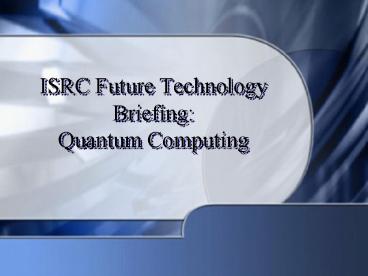ISRC Future Technology Briefing: Quantum Computing - PowerPoint PPT Presentation
1 / 10
Title:
ISRC Future Technology Briefing: Quantum Computing
Description:
1) User enters the command into the computer ... A Timeline of Implementation: Quantum Computing and Beyond. Quantum computing ... – PowerPoint PPT presentation
Number of Views:41
Avg rating:3.0/5.0
Title: ISRC Future Technology Briefing: Quantum Computing
1
ISRC Future Technology BriefingQuantum Computing
2
Why Quantum Computing?
- Question How do you handle increasing demand for
computational power? - Current answer Moores Law
3
Why Quantum Computing?
- Question what happens when we hit the physical
limit of Moores Law? - Future answer There are 2 possibilities
Optical Computers or Quantum Computers
4
Classical Computers
Quantum Computers
- Information is in the form of a digital bit, 0 or
1
- Information is in the form of a qubit, 0, 1, and
any value in between at the same time
0
1
Also known as superposition
0
1
5
5) Pole pieces, magnets, and iron ore ensure that
this process is completed without disturbance
from the environment
6
What are the Benefits?
- Increased computing power
- Factoring a number with 400 digits
- Supercomputers billions of years
- Quantum computers within a year
- Security advances
- Keys exchanged in private
- No eavesdropper can obtain private key
7
More Benefits Teleportation
- In theory
- If we can manipulate atoms, we can take them
apart and put them together - We can take apart objects and put them together
in a separate place - In practice
- Better network communication
- Senders and receivers can exchange perfectly
produced information
8
What are the risks?
- Security problems..what if I have it and you
dont? - Universal constructors that can take materials
apart and rebuild them2001, a Space Odyssey? - Change occurring too quickly
9
A Timeline of Implementation Quantum Computing
and Beyond
- Quantum computing
- Some scientists claim that they will begin when
Moores law ends, 2020 - Others say it will be three decades or more
- Beyond quantum computing
- Nanomachines
- DNA computing
10
How Can I Be Involved Today?
- Look at your current processing of
data..efficient? - Look at your security systemsdo you look beyond
the horizon? - Look at your long-run expectationsare you
meeting demand?
The nineteenth century was known as the machine
age, the twentieth century will go down in
history as the information age. I believe the
twenty-first century will be the quantum age.
Paul Davies































